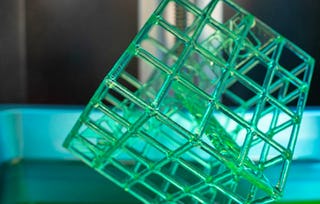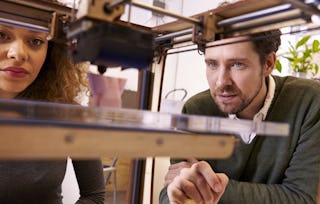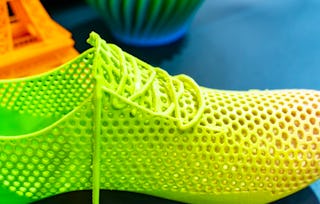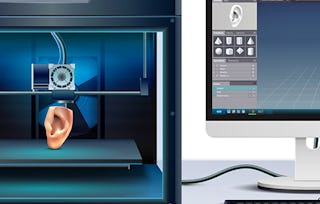This course is a deep dive into the most commonly used method of additive manufacturing: material extrusion. We specifically examine the fused deposition modeling process, and then look at the related composite extrusion process which can extrude a continuous fiber (such as carbon fiber) along with a thermoplastic.

Material Extrusion

Material Extrusion
This course is part of Additive Manufacturing Specialization

Instructor: Dhruv Bhate
2,740 already enrolled
Included with
29 reviews
Recommended experience
What you'll learn
Students will identify the two ways in which to 3D print using the material extrusion process.
Skills you'll gain
Details to know

Add to your LinkedIn profile
4 assignments
See how employees at top companies are mastering in-demand skills

Build your subject-matter expertise
- Learn new concepts from industry experts
- Gain a foundational understanding of a subject or tool
- Develop job-relevant skills with hands-on projects
- Earn a shareable career certificate

There are 4 modules in this course
This course is a deep dive into the most commonly used method of additive manufacturing: material extrusion. We specifically examine the fused deposition modeling process, and then look at the related composite extrusion process which can extrude a continuous fiber (such as carbon fiber) along with a thermoplastic. The necessary elements for each course are lecture videos, knowledge checks, and project completion. For additional information on certain topics, I've included supplemental readings and videos throughout various lessons that might enhance your knowledge. Because all resources are not available to all students, these materials are optional. In addition, you will note that some of the lectures feature our department’s graduate students. These excellent students are sometimes closer to the material, having learned it recently, so we greatly appreciate their participation in the instructional process.
What's included
1 video1 reading
This module introduces you to fused deposition modeling.
What's included
4 videos2 readings1 assignment
This module introduces you to composite extrusion. We will be working with Markforged equipment, but some of the concepts of embedding continuous fibers are relevant for other composite extrusion machines as well.
What's included
4 videos1 reading1 assignment
A key difference in most additive manufacturing processes from their traditional counterparts is that they tend to have rougher surfaces. Further, the roughness of 3D printed surfaces can be dependent on the print orientation. In this module you will analyze data obtained from an experiment to characterize surface roughness from fused deposition modeling surfaces at different orientations.
What's included
4 videos2 readings2 assignments
Earn a career certificate
Add this credential to your LinkedIn profile, resume, or CV. Share it on social media and in your performance review.
Instructor

Offered by
Explore more from Mechanical Engineering
 Status: Free Trial
Status: Free TrialArizona State University
 Status: Free Trial
Status: Free TrialArizona State University
 Status: Free Trial
Status: Free TrialArizona State University
 Status: Free Trial
Status: Free TrialIndian Institute of Technology Guwahati
Why people choose Coursera for their career

Felipe M.

Jennifer J.

Larry W.

Chaitanya A.

Open new doors with Coursera Plus
Unlimited access to 10,000+ world-class courses, hands-on projects, and job-ready certificate programs - all included in your subscription
Advance your career with an online degree
Earn a degree from world-class universities - 100% online
Join over 3,400 global companies that choose Coursera for Business
Upskill your employees to excel in the digital economy
Frequently asked questions
To access the course materials, assignments and to earn a Certificate, you will need to purchase the Certificate experience when you enroll in a course. You can try a Free Trial instead, or apply for Financial Aid. The course may offer 'Full Course, No Certificate' instead. This option lets you see all course materials, submit required assessments, and get a final grade. This also means that you will not be able to purchase a Certificate experience.
When you enroll in the course, you get access to all of the courses in the Specialization, and you earn a certificate when you complete the work. Your electronic Certificate will be added to your Accomplishments page - from there, you can print your Certificate or add it to your LinkedIn profile.
Yes. In select learning programs, you can apply for financial aid or a scholarship if you can’t afford the enrollment fee. If fin aid or scholarship is available for your learning program selection, you’ll find a link to apply on the description page.
More questions
Financial aid available,

